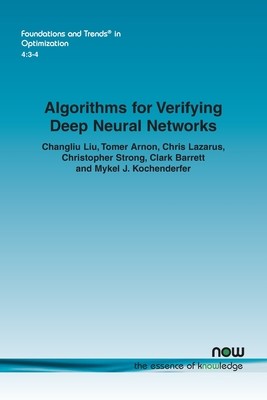
- We will send in 10–14 business days.
- Author: Changliu Liu
- Publisher: Now Publishers
- Year: 2021
- Pages: 178
- ISBN-10: 1680837869
- ISBN-13: 9781680837865
- Format: 15.6 x 23.4 x 1 cm, minkšti viršeliai
- Language: English
- SAVE -10% with code: EXTRA
Reviews
Description
Neural networks have been widely used in many applications, such as image classification and understanding, language processing, and control of autonomous systems. These networks work by mapping inputs to outputs through a sequence of layers. At each layer, the input to that layer undergoes an affine transformation followed by a simple nonlinear transformation before being passed to the next layer.
Neural networks are being used for increasingly important tasks, and in some cases, incorrect outputs can lead to costly consequences, hence validation of correctness at each layer is vital. The sheer size of the networks makes this not feasible using traditional methods.
In this monograph, the authors survey a class of methods that are capable of formally verifying properties of deep neural networks. In doing so, they introduce a unified mathematical framework for verifying neural networks, classify existing methods under this framework, provide pedagogical implementations of existing methods, and compare those methods on a set of benchmark problems.
Algorithms for Verifying Deep Neural Networks serves as a tutorial for students and professionals interested in this emerging field as well as a benchmark to facilitate the design of new verification algorithms.
EXTRA 10 % discount with code: EXTRA
The promotion ends in 22d.05:37:56
The discount code is valid when purchasing from 10 €. Discounts do not stack.
- Author: Changliu Liu
- Publisher: Now Publishers
- Year: 2021
- Pages: 178
- ISBN-10: 1680837869
- ISBN-13: 9781680837865
- Format: 15.6 x 23.4 x 1 cm, minkšti viršeliai
- Language: English English
Neural networks have been widely used in many applications, such as image classification and understanding, language processing, and control of autonomous systems. These networks work by mapping inputs to outputs through a sequence of layers. At each layer, the input to that layer undergoes an affine transformation followed by a simple nonlinear transformation before being passed to the next layer.
Neural networks are being used for increasingly important tasks, and in some cases, incorrect outputs can lead to costly consequences, hence validation of correctness at each layer is vital. The sheer size of the networks makes this not feasible using traditional methods.
In this monograph, the authors survey a class of methods that are capable of formally verifying properties of deep neural networks. In doing so, they introduce a unified mathematical framework for verifying neural networks, classify existing methods under this framework, provide pedagogical implementations of existing methods, and compare those methods on a set of benchmark problems.
Algorithms for Verifying Deep Neural Networks serves as a tutorial for students and professionals interested in this emerging field as well as a benchmark to facilitate the design of new verification algorithms.


Reviews